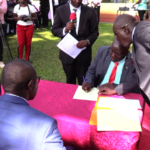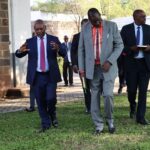The National Council of Churches of Kenya (NCCK) has called on Kenyans to actively shape the nation’s future by holding leaders accountable and rejecting corruption. During a two-day statutory meeting at the Jumuia Resort in Limuru, the council likened the current state of the nation to a “patient in the ICU,” highlighting the urgent need for reform.
Demand Accountability and Reject Corruption
NCCK Chairman Dr. Elias Otieno Agola identified corruption as the greatest threat to national security and a major obstacle to development. He urged Kenyans to reject corrupt leaders and foster a culture of integrity in public service.
“It is our conviction that only we, the people of Kenya, can stop corruption. Let’s end the culture of celebrating the corrupt and start shaming them. We must elect leaders who manifest integrity,” Agola stated.
He also advised churches to avoid accepting questionable donations from politicians, maintaining that such funds undermine the sanctity of religious institutions. “Donations should come as tithes to propagate the gospel, not to promote political agendas,” he added.
Call for Judiciary Action on IEBC Reconstitution
The council pressed the Judiciary to expedite the reconstitution of the Independent Electoral and Boundaries Commission (IEBC), describing the delay as an affront to Kenyans. The NCCK gave the Judiciary two weeks to finalize court processes related to the matter, emphasizing the need for urgent action to safeguard democracy.
“We must get our country back,” stated Reverend Canon Chris Kinyanjui, the NCCK General Secretary.
Condemning Intolerance and Protecting Freedoms
The NCCK condemned intolerance toward political leaders, citing a recent incident where Deputy President Rigathi Gachagua was heckled in Limuru. Reverend Kinyanjui reminded citizens that the Constitution protects the right to free speech and called for tolerance.
The council also called for an end to the harassment of pastors, urging clergy members to continue spreading the gospel fearlessly. “The church will not remain silent whenever the country is headed in the wrong direction,” Kinyanjui affirmed.
Concerns Over Social Health Fund and Agricultural Bills
The NCCK raised alarm over the implementation of the Social Health Fund, demanding its suspension until proper structures are established. Dr. Agola criticized hurried legislative processes that he argued could harm citizens, especially in healthcare.
Additionally, the council voiced concerns about nine pending agricultural bills, warning that poorly informed decisions could criminalize food production. They urged Kenyans to reject genetically modified organisms (GMOs) and be cautious about foreign-driven animal vaccination programs.
Advocacy for Social Justice
In his closing remarks, Dr. Agola called for the end of discrimination against persons with disabilities and stronger action to combat gender-based violence.
The NCCK’s meeting underscored the importance of citizen vigilance in safeguarding the nation’s integrity, development, and social justice. The council urged Kenyans to seize the opportunity to demand accountability and promote a fair, inclusive, and corruption-free society.



